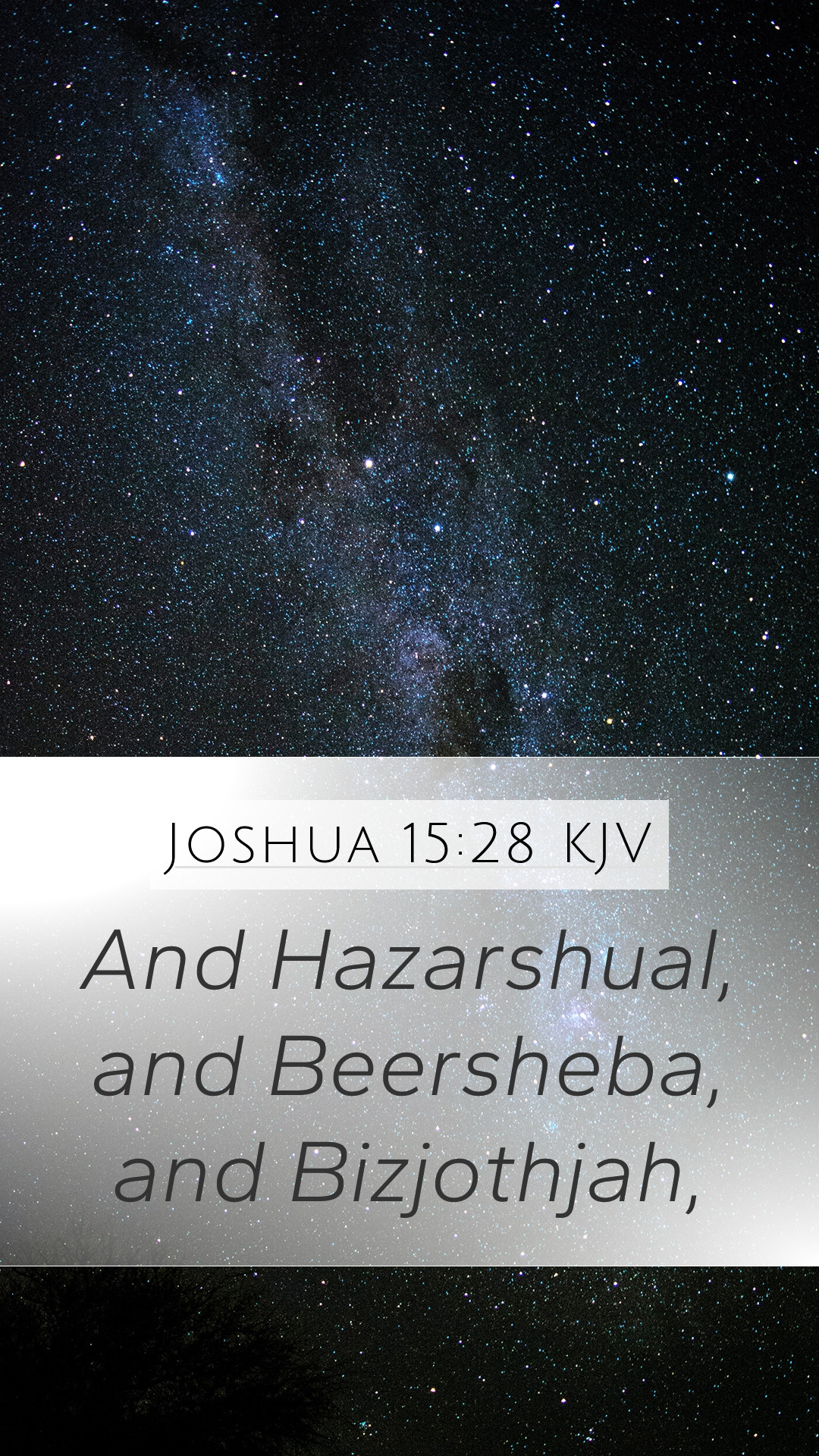Bible Verse Meaning and Commentary on Joshua 15:28
Verse Reference: Joshua 15:28 - "And Hazor, Hadattah, Kerioth, and Hezron, which is Hazor."
Overview
This passage is part of the account detailing the allotment of land to the tribes of Israel after their conquest of Canaan. It specifically lists cities that were given to the tribe of Judah. Understanding this verse requires us to delve into the geographical, historical, and theological implications of these towns and their significance in the Israelite heritage.
Historical Context
- The cities mentioned, such as Hazor and Kerioth, have significant historical importance as they were major settlements during the time of the Israelites.
- Hazor was one of the key cities that opposed Joshua and the Israelites during their conquest (Joshua 11:10).
- The listing of cities suggests the fulfillment of God’s promises to the Israelites concerning land ownership.
Interpretation and Significance
The names of cities carry weight in biblical interpretation. Matthew Henry reflects on the importance of these cities in signifying God’s provision for His people.
Albert Barnes notes that the cities' identification showcases the thoroughness of the land allocation process, illustrating that no part of God’s promise was overlooked.
Adam Clarke emphasizes the importance of names in biblical texts, linking them to the spiritual inheritance of Israel and how they represent God’s fidelity to His covenant with His people.
Key Themes
- Divine Promises: The mention of each city reminds us that God fulfills His promises to His people, assuring them of their inheritance.
- Covenant Faithfulness: The detailed accounts serve as a testimony of God's covenant faithfulness from generation to generation.
- Identity and Heritage: The cities listed contribute to the national identity of Israel, as they connect the present with the past, fostering a sense of belonging.
Practical Applications
- Understanding the significance of God’s promises can encourage believers in their faith journey, reminding them that God’s word is trustworthy.
- Reflecting on the historical allocations can inspire us to appreciate and take responsibility for the spiritual inheritance we have in Christ.
- Bible study groups can use this passage to discuss the themes of God's faithfulness and the significance of legacy in our spiritual lives.
Additional Bible Cross References
- Joshua 11:10 - "And Joshua turned back at that time, and took Hazor..."
- Joshua 15:13-14 - “And to Caleb the son of Jephunneh he gave a portion among the children of Judah...”
- Hebrews 11:6 - “But without faith it is impossible to please Him...”
- Revelation 21:1-2 - "Now I saw a new heaven and a new earth..."
- Psalms 37:29 - "The righteous shall inherit the land..."
Conclusion
This verse may seem like a simple listing of places, but it serves a greater purpose in illustrating the faithfulness of God and the importance of land in the biblical narrative. Through thoughtful study and reflection, one can extract profound insights into God's character and His ongoing relationship with humanity.
SEO Keywords
Primary Keywords: Bible verse meanings, Bible verse interpretations, Bible verse understanding, Bible verse explanations, Bible verse commentary, Scripture analysis, Biblical exegesis, Bible study insights, Meaning of Bible verses, Understanding Scripture.
Secondary Keywords: Bible study groups, Online Bible study, Bible study tools, Bible study resources, Bible study guides, Bible study lessons, Bible study topics, Bible study plans, Bible study materials, Bible study courses.
Long-Tail Keywords: How to interpret Bible verses, Understanding difficult Bible passages, In-depth Bible verse analysis, Historical context of Bible verses, Applying Bible verses to daily life, Meaning of parables in the Bible, Significance of Jesus' teachings, Old Testament prophecy interpretations, New Testament epistle explanations, Symbolism in the Book of Revelation.
User Intent Keywords: What does Joshua 15:28 mean, Explanation of Joshua 15:28, Commentary on Joshua 15:28, Significance of Joshua 15:28, Application of Joshua 15:28.


